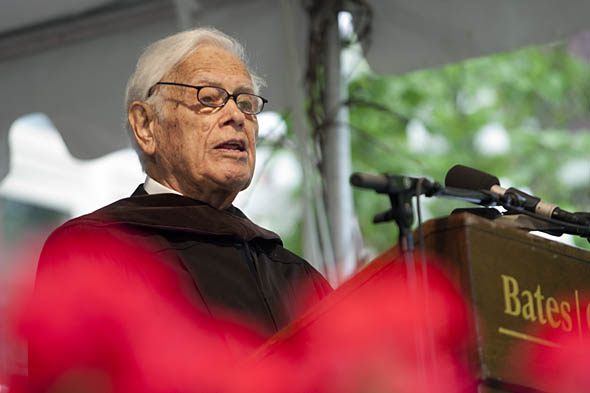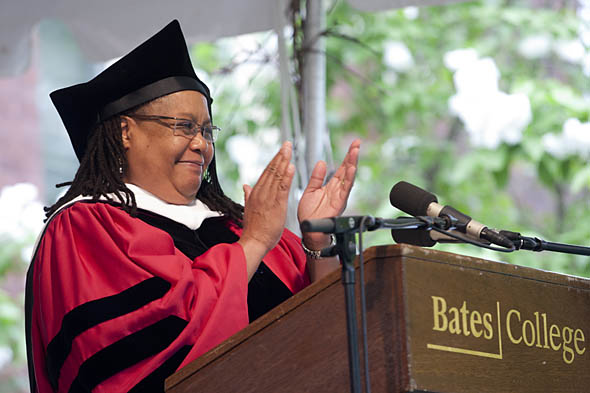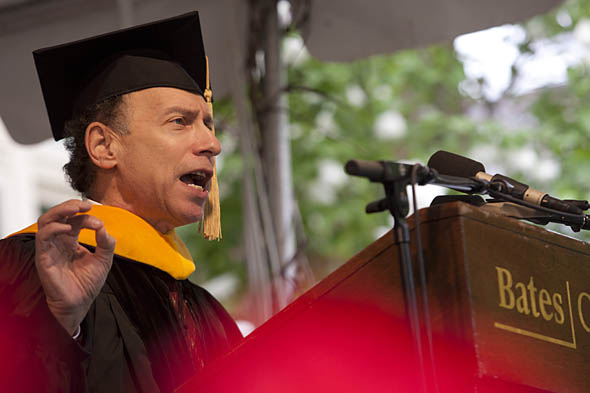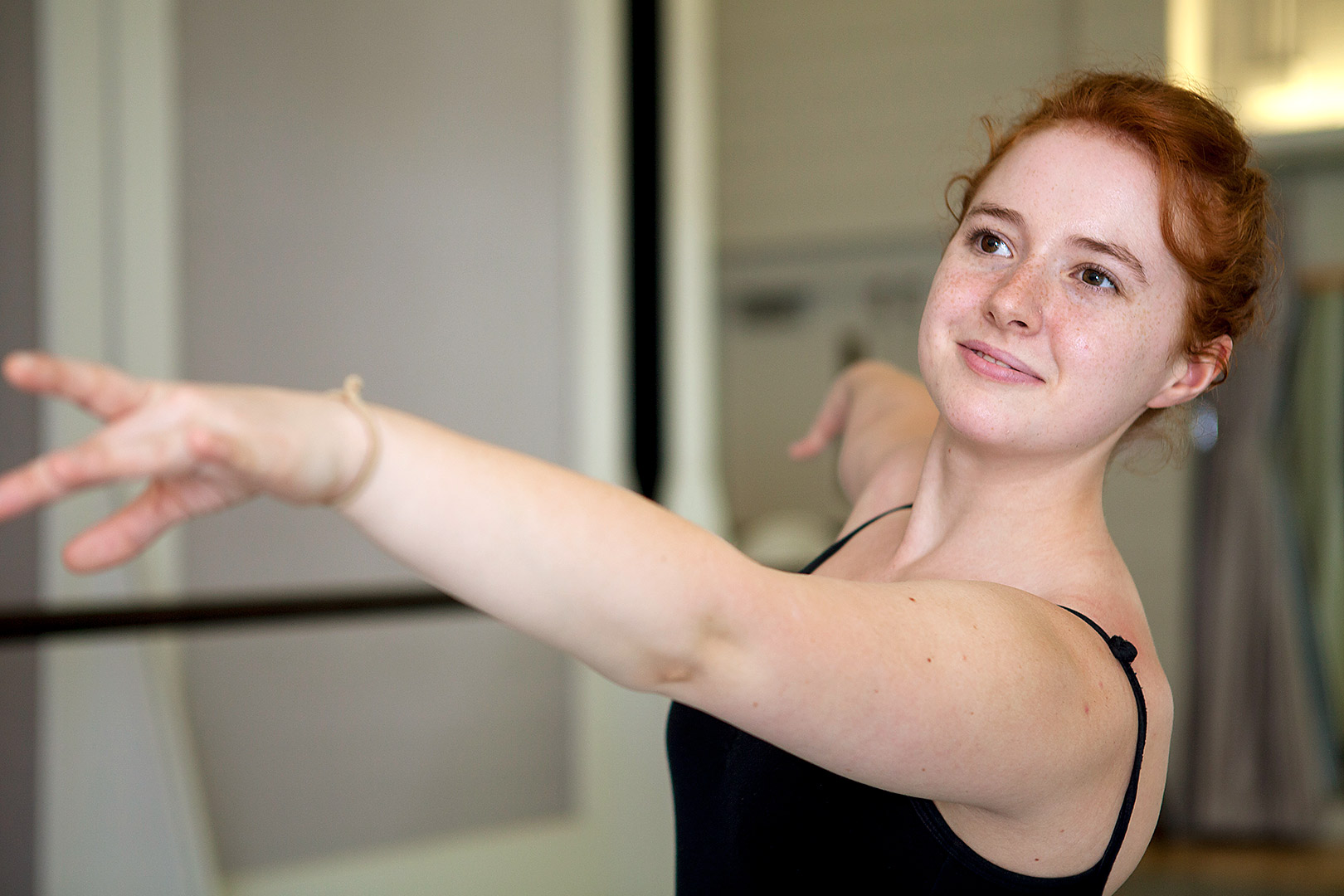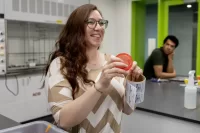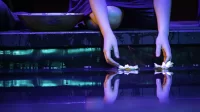
Commencement 2011: Glazer, Hammonds, Langer honorand speech transcripts
The following is an unedited transcript, subject to change and correction, of Commencement 2011 remarks by honorary degree recipients Frank Glazer, Evelynn Hammonds and Robert Langer.
Frank Glazer, Bates Artist in Residence and Lecturer in Music, honorary Doctor of Fine Arts degree:
President Hansen, honored guests, members of the Class of 2011 and their families:
I would like to congratulate and salute the graduating class for having successfully completed four years of arduous study, and also to share with you a few ideas that I’ve taken note of during my 75 years of teaching and interacting with people in many countries during times of peace and war.
These ideas if acted upon may be helpful to you as they were for me. Of course, the circumstances are entirely different, but the principles, call them truisms, remain the same.
In addition to having the attributes of self-reliance, self-discipline, the capacity for work and faith in one’s mission, all of which are good and important starting points, I believe that development as a human being is best served by hardly ever saying, “I can’t” or “I won’t.”
Sometimes, others may see possibilities in us that we are totally unaware of. And if, instead of saying, “I can’t” or “I won’t,” we act upon these possibilities, our lives may be immeasurably enriched and we may thereby enrich other people’s lives.
I’ve discovered also that when our applications are rejected, there is no point in dwelling on our disappointment, because this rejection may turn out to be a great blessing in disguise.
One notable example: During the war in France, my commanding officer was determined that I be given a direct commission in the field to become an officer, because I was doing officer’s work for private first-class pay. He applied to two different areas of service, and both were denied. I didn’t realize then how fortunate I was, because had this effort succeeded I would have had to agree to stay in the military for one extra year, and had I done that, I would never have met my wife, to whom I owe many of my accomplishments during the course of 54 years of our most wonderful marriage, in addition to a great friendship six years before that.
If you have faith in your mission, your goal, your dreams, I urge you to remain true to this commitment, which is at the very core of your existence. In other words, be true to yourself. Sometimes, well-intentioned friends may try to divert you from your objective, for reasons of expediency, perhaps for the attainment of greater financial gain. Or, if you should decide you need to change course temporarily they may assume you have made a crucial wrong turn that would ruin your career, whereas you know it is only a detour which seems necessary at the time. But they won’t understand this.
Any compromise here may be the source of your greatest regret, with concomitant loss of your self-respect.
Being optimistic is also very helpful because for one thing, one feels better. Furthermore, there are times when we can all do with a bit of help, whether it is financial or moral support in our work. Fortunately, there are people who want to help but wouldn’t do so if they perceive us to be saddled with negative attitudes.
You remember the old adage, “Smile and the world smiles with you, weep and you weep alone”? I have a beautiful Steinway piano given to me 64 years ago by friends because they were pleased with how I answered the questions about my experiences during the war. They told me that of all the young people they knew who came back, including their son-in-law, who had been a captain in the Air Force, I was the only one who didn’t complain about having served.When I was telling them about my experiences, I had no idea they were taking note of my attitude.
The idea of being persistent may be a cliché for you, but it is terribly important. It saved one of my graduate students at the Eastman School of Music from having to go to war in Vietnam. He had a teaching fellowship, and to avoid being drafted in the military, he had to provide the induction board with proof that he was carrying a full load, which was a requirement to avoid military service.
Oddly enough, no one in six different offices he went to knew the answer. But because of his persistence, he decided to go back the first one, the Registrar’s Office, and this time someone came up with the answer.
On the lighter side, I like to cite the fact of our great composer Schubert. He was his parents’ 12th child. And had they stopped after 11, think what we would have missed [laughter].
Finally, I believe it serves no useful purpose to compare oneself with another person. Each of us is unique. We are dealt a certain hand a btirth, over which we have no control. But we have a lot to say about how we play the game. My mother didn’t care about any of her children becoming rich or famous. What concerned her was that each one be a decent person.
Remember that love it not only the beginning and the end, but like the infinity of dots on a line, it is all things in between. So, with good grace, accept yourself for who you are and will be, without worrying about who you aren’t, and never will be.
Do your best and let time do the rest. And keep smiling. Thank you.
Evelynn Hammonds, Dean of Harvard College, honorary Doctor of Humane Letters degree:
Thank you to all of you: President Hansen, members of the Board of Trustees, Bates faculty members, parents, siblings and friends; and a hearty congratulations to the Class of 2011 [applause].
It’s really a tall order to offer wisdom to a captive audience already over-supplied with advice. So in mulling over what I might best offer you in this final moment of your undergraduate career — a four-year stretch in which many smart people have offered you their opinions, and from which you may well be ready to move on without yet another speech from a well-meaning professor — I thought about the many, many Commencement speeches I’ve heard, and about one of the people who did it best, year after year, decade after decade.
A colleague of mine passed away just a few months ago. His name was Peter Gomes. He was the Plummer Professor of Christian Morals and the preacher in Memorial Church. He served Harvard University for more than 40 years. But before he was at Harvard, he was at Bates, where he was a member of the Class of 1965 and later a Trustee.
Peter was nationally known for his stance on tolerance. He was a bundle of apparent contradictions: a religious, gay, Baptist, black, professor, Republican, Afro-Saxon (that was his term) [laughter]. From this complex life experience, and from a lifetime of careful reflection, Peter distilled vast wisdom that integrated powerful qualities of mind with a great capacious heart. With these gifts, he became a champion of tolerance in every arena of his life.
I’d like to pass long some of that thoughtfulness and generosity on to you today as you step forward into your lives in the larger world beyond Bates College.
Bates has already provided you with a meaningful example of integrating the intellectual and moral. As you all well know, your college was founded by radical abolitionists, and has the unusual status of having been coeducational and multiracial on an equal basis since it opened its doors in 1855.
As Peter memorably put it, when speaking at your Sesquicentennial, this makes Bates quite peculiar in the best of ways. He went on to reminisce, that “at Bates, we were always tested and told to challenge the conventional wisdom, and most of us did. We existed in an unconventional world. And if we are true to our Bates identity and inheritance, we continue to be very peculiar people in a very ordinary world. That is a claim that I think we should celebrate and treasure; it’s part of our uniqueness.”
But what I’d like to urge you to do today is not only celebrate your peculiarities, whatever they may be. And, given that among the many of you here today you represent 35 states and 42 countries, I have no doubt of the diversity of your origins. And I also fully trust that you carry with you a huge range of talents and interests and unusual qualities of mind and use them to transform the world in your image.
Now, when you are different and somewhat peculiar, there can be a great deal of pressure from the world to do the same thing, to fit within the roles that have already been scripted for you, to resolve apparent contradictions by erasing them. I’d like to urge you to do something different.
I’d like you to try your hand at failing, and, by failing, to discover something more about your own fortitude and, in time, about the way you can shift the expectations of the larger world with your success in unexpected places.
In college, I spent a few summers working at Bell labs, working to do laser physics. While I studied at Spelman College, my small college didn’t have a lot of money for fancy equipment. I had never even seen a picture of the kind of carbon dioxide laser I would be working with I arrived at the labs that summer.
Now, one of my jobs was to build circuits for the laser controller. My first circuit didn’t work at all. Neither did my tenth. I built circuits for weeks, and none of them worked. I was saved by the generosity of my mentors, inspired by their spirit of adventure, and pulled through by my own sheer stubbornness.
So, I’m here to tell you that by the second summer, I was the master of circuit-building and the laser. And, later, in many ways, because of that experience I became the first African American woman tenured through the ranks at MIT [applause].
The experiences I had at the lab, rocky as they were, let me see things that I otherwise would have been blind to, and later made it possible to do new work on the roll of race and gender in science and to contribute changing the culture of science. But the fact is, sometimes being peculiar makes doing a hard thing even harder. Whether because you haven’t had access to the same resources as others, or because people have assumed you aren’t cut out for certain work, or because you yourself are afraid that there might not be a place for you.
To tolerate failure and frustration requires, if you will excuse the alliteration, fortitude.
In one of his many influential books, Peter Gomes defined fortitude as “that moral quality that allows us to persevere when others would easily give up or give in. It is the fuel of the long-distance moral runner, who despite inner fatigue and apparent outward success of others, nevertheless keeps on keeping on.”
Bates was founded by long-distance moral runners. They, like me and like you, met with frustrations and trip wires, both pragmatic and social and psychological. What I hope for you, like the strongest of your forbearers, that you will do what is right for you and what is right for the world, in the most creative and peculiar ways. You will fail. You should fail. And if you stick with it, and let your peculiarities become assets, you will succeed. And when you succeed, remember those moments at which you failed, and think you how might extend your hand to those who walk in similar paths behind you, and, hopefully, you’ll be a beacon for them.
Congratulations. I look forward to the world that you will help to build.
Robert Langer, David H. Koch Institute Professor at MIT, honorary Doctor of Science degree:
I want to congratulate all of you. Graduation from a school as fine as Bates is a wonderful achievement, and you and all your families deserve to be very proud. I just want to congratulate all of you [applause].
In considering the messages I want to leave with you today, I thought I’d mention two, which will actually echo some of what you have just heard, though I think I’ll say it a little differently. But I really agree with those messages.
My messages are two-fold. First, try to dream big dreams, dreams that can change the world and make it a better place. Secondly, if things start to look bad, no matter how bad they look, don’t ever give up on those dreams.
I thought I would share with you my own struggles and decisions when I was a student to illustrate some of these points. When I finished colleges, perhaps like some of you, I didn’t know what I wanted to do career-wise. I graduated in the 1970s with a degree in chemical engineering, and some of the parents and grandparents in the audience might remember at that time, just like a few years ago, there was a gas shortage. But it was even worse in the 1970s, because not only did the price of gas go way, way up, but at least in Boston where I lived, you had to wait at the gas station for two hours to get your car filled up.
But the consequence of that was that if you were a chemical engineer, you got a lot of job offers. Nearly all of my classmates in the 1970s joined oil companies. They had many, many openings and they paid very, very high salaries. I actually got over 20 job offers from oil companies, actually four from Exxon alone. I also got offers from Shell and Chevron and others. I think the only company that didn’t offer me a job was British Petroleum [laughter]. And I don’t think they interviewed at MIT.
One of those job interviews made quite an impression on me. I went to this interview at Exxon, and one of the engineers said to me that if we could just increase the yield of a particular petro-chemical by .01 percent, wouldn’t that be wonderful. “That would be worth billions of dollars,” he said. I remember flying back to Boston that night thinking, “I really don’t want to do that.”
But what did I want to do? I had this dream of wanting to use my background to improve people’s lives. And I’d spent a lot of time as a student starting a school for poor high school kids, and developing a new chemistry and math curriculum. One day, I saw an ad for an assistant professor to do just that at City College in New York. I wrote them a letter, but they didn’t write me back.
But I really liked that idea, so I found all the ads that I could to do that. I found about 40. And I wrote to all those schools, and none of them wrote me back.
That wasn’t going so well. So another idea I had to help people was through health-related research, so I applied to a lot of hospitals and medical schools, and they didn’t write back either [laughter]. But then one day, one of my friends told me that I should write to Dr. Judah Folkman, who was a surgeon. He said, “Sometimes, he hires unusual people”[laughter].
I did what at that time seemed like a huge risk to all engineers, and started doing research in a hospital. It might seem more common today, but at that time, no chemical engineer had worked in a surgery lab before.
I began working on two problems: Trying to isolate and discover the first substances to stop blood vessels from growing into cancer tumors; therefore helping to stop cancer. And second, developing plastics that could release these and other substances for really long times in the body. And before I tackled these problems, no one had been able to develop ways to do this. In fact, scientists kept telling me that it was impossible to do it. Maybe the only thing that I had going for me was that I just hadn’t read the literature saying that it was impossible [laughter].
So I spent two years working on this. I found over 200 different ways to get this to not work. But finally, I made a discovery and we did get it to work. I should add that these findings were initially met with great skepticism by the scientific community, which was very disappointing to me. But over time, many people and companies began using what we did, and it’s led to new treatments for cancer, heart disease, certain forms of blindness, and many other medical problems. Subsequently, our lab made discoveries in nanotechnology and even also new ways of creating new tissues, like skin for burn victims.
I am really thrilled that even though my career path was not straightforward, and it may not be straightforward for many of you either, which is OK – in fact fine – that it’s been a journey that’s enabled me to realize the dreams that I had of the good that science can do for the world.
If I had any advice, any words of wisdom for the graduates in this audience, it would be to dream big dreams, about how you can do things to help people and improve the world. But there may be many, many times when you try to do something, whatever that dream is – developing a new product, could be an article or a book – whatever your dream is, many people may tell you that it’s impossible, that it will never work, that you’ll never achieve it.
But I think that’s very rarely true. If you really believe in yourself, if you’re persistent and work hard, there’s very little that is truly impossible. Thank you, and again, my sincerest congratulations to all of you and your families.
